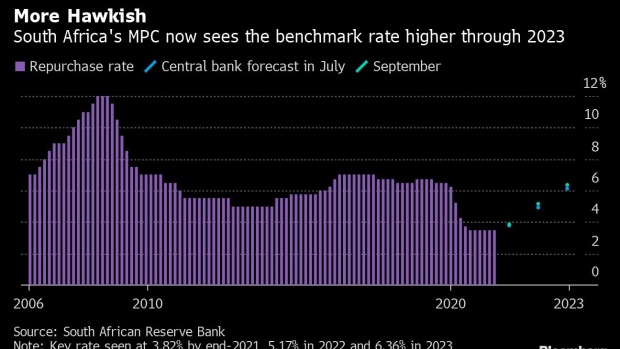Sep 23, 2021
South African Central Bank Signals More Hawkish Stance on Rates
, Bloomberg News

(Bloomberg) -- South Africa’s central bank held its benchmark interest rate for a seventh straight meeting and turned more hawkish on raising borrowing costs through 2023.
The monetary policy committee kept the repurchase rate at 3.5%, Governor Lesetja Kganyago said Thursday in an online briefing. The decision by the five-member panel was unanimous, the same as in July.
The key rate remains at the lowest level since it was introduced in 1998. The unchanged stance was anticipated by all 19 economists who took part in a Bloomberg survey.
The implied policy rate path of the central bank’s quarterly projection model, which the MPC uses as a guide, indicates a 25-basis point increase in the final quarter of this year and in every quarter of 2022 and 2023. Forward-rate agreements starting in 12 months jumped 13 basis points to 5.08%, signaling traders are pricing in 140 basis points of tightening over the next year.
“The QPM is quite hawkish, signaling core rates to be at 6.36% at the end of 2023,” said Michelle Wohlberg, a Johannesburg-based fixed-income analyst at Rand Merchant Bank. “FRAs have repriced higher off the back of this -- but the rest of the statement was relatively dovish, keeping inflation expectations unchanged with downward growth revisions for next year and 2023.”
Changes in the way the statistics authorities calculates gross domestic product, which showed the economy is 11% bigger than previously estimated, helped the bank raise its economic growth forecast for 2021 to 5.3% from 4.2%. The bank raised its outlook despite deadly riots, looting and arson that erupted in the two biggest provinces by contribution to GDP, which are expected to contribute to a 1.2% contraction in the third quarter.
The economy will probably grow 1.7% in 2022, compared with a previous estimate of 2.3%, and 1.8% the year after, down from 2.4% before, the bank said. The central bank raised its inflation forecast for this year and continues to project that the rate of price growth will remain close to the 4.5% midpoint of its target range through 2023.
The unchanged stance is likely to draw criticism from politicians and labor unionists, who say the Reserve Bank should be doing more to support an economy that contracted the most in at least 27 years in 2020, and reduce unemployment that’s at a record high. The MPC cut the key rate by three percentage points in 2020, of which 275 basis points of easing was in response to the Covid-19 pandemic.
©2021 Bloomberg L.P.